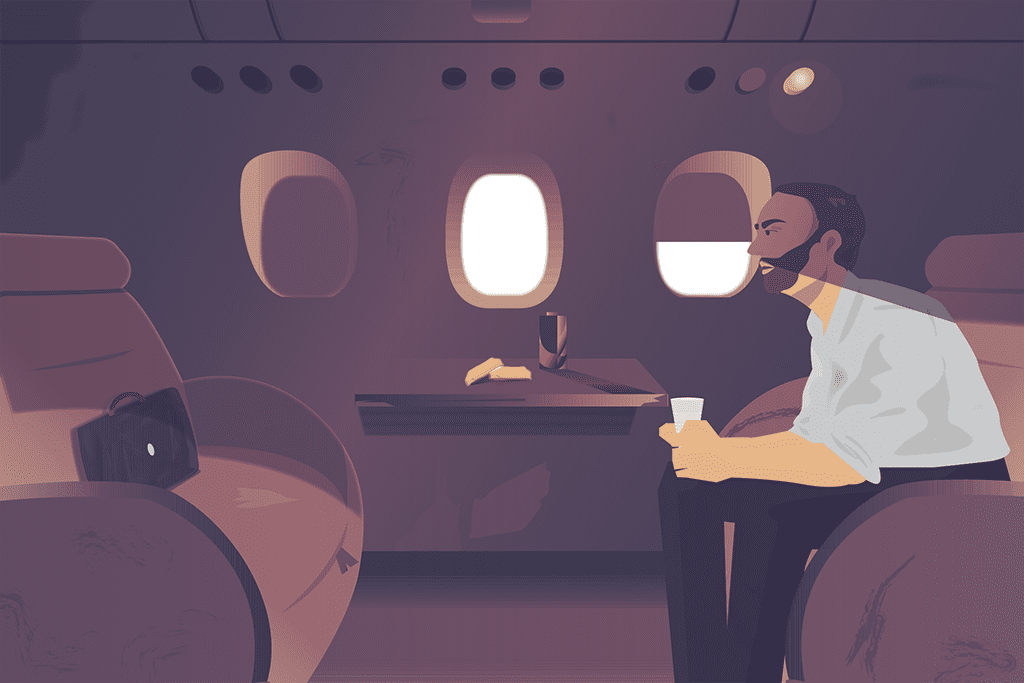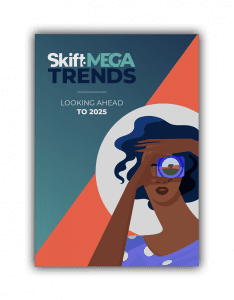Skift Take
If airlines and hotels end up cutting back too much, they would risk providing plenty of opportunities for new companies to emerge, fill gaps, and gobble up market share. But a faster recovery in corporate travel would make this issue moot for a lot of companies.
In January 2021 we released our annual travel industry trends forecast, Skift Megatrends
. Because of the havoc that the pandemic triggered, we wrote Skift Travel Megatrends 2025 as a vision of how travel industry dynamics could play out five years from now. You can read about each of the trends on Skift, or download a copy here.
While some hotels and airlines hobbled through to the other side of the crisis, leaving many corporate casualties behind them, in 2025 they look very different than they did before. In fact, there is a wave of mediocrity that characterizes product and service levels throughout portions of the travel experience.
The hotel lobby experience is less personal than it was pre-pandemic due to the industry migrating toward contactless features, including mobile check-in and check-out functions from smartphone apps. Hotels sliced labor costs, especially for housekeeping. Daily cleaning and various room services are no longer standard across all segments of the market, especially more affordable brands geared toward leisure travelers and drive-to markets.
Legacy airlines gutted point-to-point routes over the last five years in favor of sending most flights through their hubs in 2025. Airlines had parked nearly entire sub-fleets of aircraft like the Airbus A380 or Boeing 777, even those upgraded with new business class products, due to catastrophic declines five years earlier in corporate travel that have yet to fully recover.
Major airlines dialed back in-flight services and capital expenditure projects at airports as a way to shore up cash during the worst of the pandemic. The less-than-robust return of business travelers who expected these array of services meant many of these offerings never came back to their former quality levels after the pandemic.
Opportunity Beckons
But the cost-cutting has also presented an opportunity for niche carriers and hotel brands to come in and disrupt a travel industry marked by increasing mediocrity from its biggest companies.
Airlines like David Neeleman’s Breeze, similar to JetBlue before it, offer point-to-point travel and improved onboard services to meet demand from flyers turned off by service and product declines. Companies like Dallas-based airline JSX also made strides, offering active business travelers the high-end service they expect without the headache of traipsing through airports crammed with leisure travelers simply looking for the most affordable fares.
Many hotels have retreated to offering daily housekeeping and high-touch features at only upper-tier properties. Some of the soft brands tied to big chains do offer some levels of pre-pandemic services. But there is disruption afoot from a growing roster of boutique brands that global chains like Marriott or Accor have somehow yet to acquire. They are filling gaps with concierge-like services, and counteracting the contactless push among many brands with traditional hospitality services.
Counterpoint: Although the pandemic was a brutal time and cratered business travel demand, the travel industry has fully returned in 2025 to pre-pandemic performance levels.
Business travel may look slightly different with fewer quick trips, but large companies conduct quarterly meetings, making convention hotels as popular as ever. These replaced daily commutes to the office, which many companies did away with entirely.
Loyalty programs are packed with new members as more employees are on the road or at least checking into a hotel for a few nights per quarter to get up to speed on happenings at work at periodic company-wide meetings. This has led to a blitz of major brands trying to differentiate their products to attract more corporate customers.
Airlines similarly ramped up their services in the years right after the pandemic to appeal to the limited number business customers there were flying in the early stages of the recovery. With more business travelers back on the road and in the air in 2025, airlines are once again trying to outdo one another with private suites in business class and higher tier qualifications in their loyalty programs.
Yes, major airline CEOs in the United States have kept their word on not reintroducing change fees, but airlines are also playing it conservative in some ways: The days of Etihad-style apartments in the sky are an anachronism.
There are always opportunities for disruption, but those windows are often limited to niche players in select geographies or market segments. Few are truly going head-to-head with legacy airlines or the biggest hotel companies.
Download Your Copy of Skift Travel Megatrends 2025
Skift Megatrends 2025 is made possible by our parters: Abu Dhabi Convention & Exhibition Bureau, Accor, and American Express.
The Daily Newsletter
Our daily coverage of the global travel industry. Written by editors and analysts from across Skift’s brands.
Have a confidential tip for Skift? Get in touch

